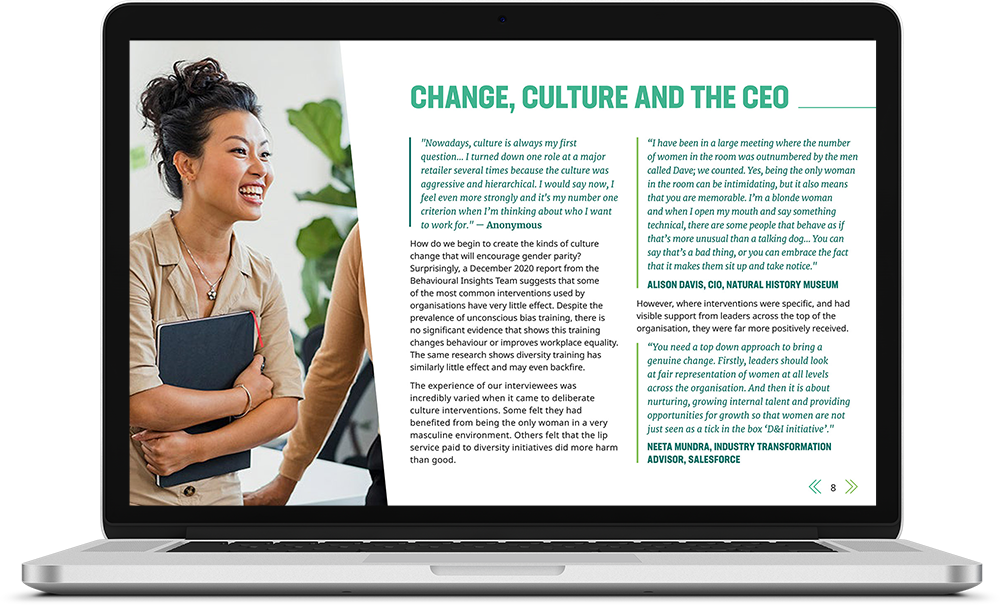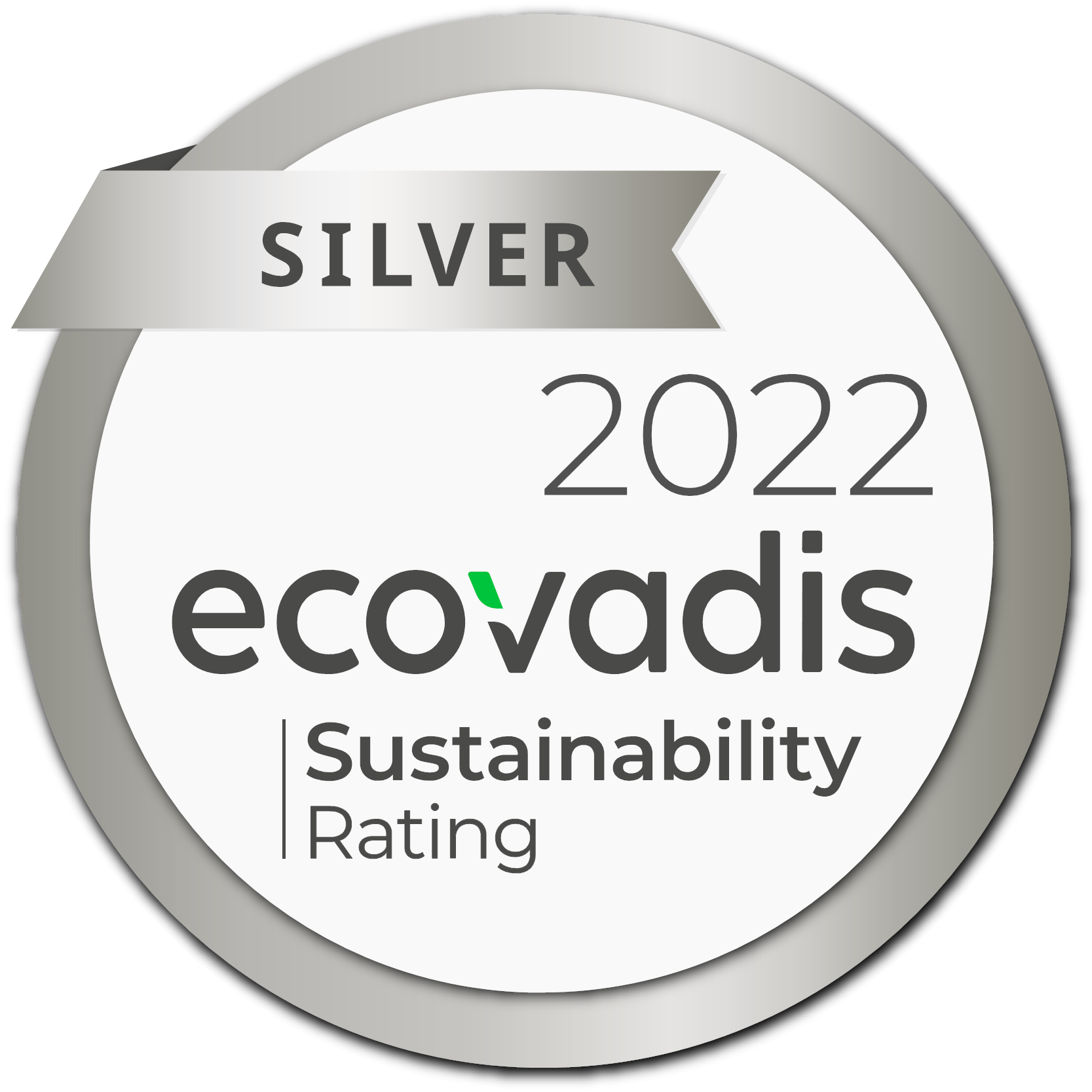Tech’s Leading Women
A video podcast series on lessons in gender, culture, and building an inclusive workplace.

Episode three
Nurturing the missing middle
In the tech industry, the drop-out rate for women is estimated to be 50% by the time they reach 35. We call this demographic ‘the missing middle’—the women who disappear altogether or the number who go ‘missing’ from senior roles. In this episode, we delve into this trend and examine why this is happening, why it matters, and what we can do to retain this talent.
Zoë: Welcome to Tech’s Leading Women, a video podcast series on lessons in gender, culture, and building an inclusive workplace. I’m Zoë Morris and I’ll be moderating today’s conversation. I’m the president of Frank Recruitment Group, a staffing firm specialising in finding and placing outstanding technology talent globally. We’re dedicated to helping our customers build more inclusive workplaces across all pillars of diversity, not least gender. That’s why in 2021, as part of our gender inclusion initiatives, we commissioned a white paper that delved into some of these key issues impacting women in tech.
The new podcast series is inspired by our findings from that paper, giving us the chance to explore some of these trends in more detail. In the tech world, we talk a lot about getting more women into the industry, but what happens once they get there? Research from Accenture shows that in the tech industry, the dropout rate for women is 50% by the time they reach 35. That’s an outstanding figure and well above the average we see in other industries. We call this demographic of tech professionals, the missing middle. Of course, there’s a correlation between this dropout figure and the age women start to have children, but in reality the situation is more complex than that. Systemic sexism, non-inclusive cultures, and the sheer pace of technology can all contribute to the loss of women from the workforce.
So, what can the tech industry do to retain this pool of talent and help more women progress into senior roles? I’ll be exploring all of these points in more detail today with two fantastic panellists who are pioneers in their respective fields. So, let’s meet them.
First up we have Mary Chaney, the Chairperson, CEO, and President of Minorities in Cybersecurity. Mary is committed to hiring and building diverse and talented teams that help organisations achieve their tactical, operational, security, and privacy objectives.
Also joining our panel, we have Jeanne Cuff, Associate Director ISG. Jeanne has over 20 years of experience in senior leadership and consulting roles, and through her volunteer work, she’s helping more women to break into the IT sector. Thank you so much for both joining me today.
I’m really looking forward to hearing your views on this issue. I know we have lots to cover, so let’s get started with our first question. So, as I mentioned earlier, research shows that by the time women reach 35 years old, 50% of them will leave the industry for good. So firstly, I’m interested to know if you are aware of this trend, and do you think it’s widely recognised? And I think I’m going to start by asking Jeanne that first.
Jeanne: I was aware of that trend. I’m aware of it from a personal point of view, as well as a work point of view. I went back to grad school when I was 50 and out of 27 people in the class, there were five women and we all got our masters in technology management. The following year that we graduated, two years later, there were zero women in that programme, and so from a personal perspective, I was stunned. You know, because that really surprised me, but I also see it in our work. I feel like that’s, you know, I’m not seeing as many women being part of this discussion because they have so many competing requirements and needs going on in their lives. So, that’s really where I have seen it both in work and in my personal life.
Zoë: Okay, and Mary, were you aware of it? And do you think other people are aware of what’s happening?
Mary: I do, I do, especially in the cybersecurity space. It’s something that is readily apparent just by the women that you come across in the space. I mean, I’ve been in a lot of fields that are male dominated too. You know, I’m an attorney, I was a special agent for the FBI, which, you know, there are not a lot of women there either, and then, you know, going into corporate America and often times being the only woman of colour, and then the reason why I started Minorities in Cybersecurity essentially, was because women would come up to me when I was on these speaking events and they would want me to mentor them, and they were struggling to try to find and you know, and it wasn’t that they were struggling with the knowledge piece, the technical piece, they were struggling with the culture piece, and feeling like they were valued members of the team, feeling like their voices were heard, and so, yeah, I I’ve been aware of it, and it’s one of the reasons why I founded Minorities in Cybersecurity.
Zoë: Absolutely interesting. So, if we delve in a bit deeper, I think we might assume that it’s because women want to start a family that we see this drop out. However, dropout rates in other industries are about 20%. So, why do we think the number is so high in technology? And where do we think the problems are sort of stemming from? And I’ll start with you this time, Mary.
Mary: I don’t know. You know, I think just from experience and from talking to folks, it actually is culture, right? It’s why do I want to deal with this male-dominated field where I don’t feel valued, appreciated? And you know, the children thing is not necessarily the driving force, I don’t think. I think it really is the fact that, you know, you can only be in so many meetings and be ignored before you start to feel like this just may not be the right space for me, right? The same problems, different positions, different companies, and companies haven’t really done a good job with actually making women feel valued, and they put a lot of the burden on the women themselves, the minorities themselves to make culture better, but not necessarily looking at what they can do to drive the ability for tech women to feel comfortable in their environments.
Zoë: So, you think there’s bit self-perpetuating? We’ve already got the problem and you know, women are looking above them and thinking, I’m going to sort of just self-select myself out. We’re are not going to change this sort of 50%. Jeanne, sorry, what were your feelings on this?
Jeanne: No, that’s okay. I agree with what Mary was saying, but there’s also like this whole thing of how you start in tech. A lot of people start at the help desk and, and to jump on what Mary was saying, there’s also like, are you being heard? So, if you’re starting at the help desk, a guy’s maybe speaking up and saying something, and so is a young woman, but she’s not getting heard, he’s getting heard, and to what Mary was saying, that is a huge, huge problem, and so then you end up getting stuck and the women aren’t seeing the opportunities to make the next career change. And again, companies are not thinking this through. They’re not thinking, “How can we add these people who add a point of view and a diversity to our higher-level engineering teams?” And things like that. As well as, it’s such an intense process. You know, working in IT. I’ve worked in it for 25 years, and Mary and I have both worked with very male-dominated environments. It’s really tough, you have to have a little layer of toughness that not everybody’s willing to do, and that’s really a challenge, I think, for a lot of young women, and there’s a confidence level. It’s the imposter syndrome. Sometimes you just got to be a big mouth, but it’s hard, and I’m a big mouth, but it’s still hard to do, yeah.
Zoë: And you both say about not being heard, what do you actually mean by that? I’ll be sort of interested to hear both of your views on that. Mary, what do you mean when you say being heard?
Jeanne: You should talk first.
Mary: I should talk first?
Jeanne: You should go first.
Mary: Well it’s really, I can point to several different things that have happened in my career where, you know, the most obvious example is when you say something in the meeting, and then, you know, two minutes later a guy says something and then they jump on and say, “Oh, I agree with you Bill.” And it’s like, no, but didn’t Mary just say that? And that’s one of the things. But I’ve also had some, you know, racial type of things happen to me where I can’t, you know, I can’t use my voice because if I use my voice then we will be determined to be the angry black woman. So, we actually have, there’s a couple of things that are nuanced, you know, to be a big mouth or, you know, as Jeanne said, or to be passionate. You know, it looks different when it’s coming from a woman of colour maybe, than it does from someone else. So, there there’s some nuances there to how you in fact go about being heard.
Jeanne: I had dinner one time, I was in the CIO group and we had a dinner, and it was me and like eight men, and we were all talking about some of the problems they had with getting, how they’re having such a hard time finding developers. And I said to ’em look, “You’re not supporting girls in technology.” “You’re not paying and supporting these programmes for 12 year old girls, so they don’t see themselves in those roles.” And so I explained this all to ’em. I admit I had a cocktail, and so afterwards, this one guy came out and started telling me what I had just told him, and I was like, “Oh, my goodness.” And I just said, “All right, you just mansplained that to me, I have to leave.” And this other guy next to him started cracking up going, “She’s right!” “You just told her what she just told all of us.” And I’m like, “There you go.” And that is it in a nutshell.
Zoë: That explains it very succinctly, yes. So, what do you believe is the effect of losing talent from this specific demographic to the technology in interest? What is going to be the long term issues that arise from this? And Jeanne, I’ll go to you first.
Jeanne: Oh, I am so full of this. This is like my rant, okay. So Mary, apologies in advance. So, what happens is all these things are happening in technology, and AI, and all these other things, they affect everything. Like you think about bathrooms and how they’re situated, where the faucet is. If you don’t have engineers that are smaller, the other thing is, I know, this is something, a lot of people don’t know, Mary knows this, people of colour could not wash their hands because the detector for the hand washing didn’t detect dark skin. So, these people couldn’t wash their hands under these automatic detectors. That’s because you don’t have diversity in that system, and maybe it’s too high or too low. Every time I go anywhere I think about the fact that if there were women engineers, for example, planes, why do they store everything up top? I had once, you know, luggage fall in my face. If you have women, smaller people, people of colour doing things, all these things would make more sense. They would have a point of view that brought diversity to the engineering problem. I think it affects our day to day life. So sorry, that’s my little rant, I’m done. I love that question.
Mary: No, that’s perfectly fine, and she’s absolutely right. I mean, I go on a rant all the time about algorithms and how algorithms are developed and there’s no transparency behind all these algorithms in these decision making processes with AI. You know, that I’m a lawyer too, so they had these automatic sentencing guidelines, and then, you know, there’s a bias being shown towards people of colour. You know, I think it was Amazon that turned on their little AI robot and it became a racist, sexist robot just based on the fact that it was listening to what was going on out there in the world. So, when you do not have diversity being involved in these processes as coding, you know, the decision making process, it’s going to be skewed towards a homogeneous male viewpoint, right? And that’s the challenge, and it becomes, you know, my world, and the things that I’ve done, and the things I’ve gone through in my world is completely different than a white male experience, and if you don’t value both of those experiences in getting both of those viewpoints, then you’re going to fail in trying to create something that could potentially be, across the board, fair.
Zoë: That makes sense. So basically, lack of diversity is going to just start creating a very one-dimensional world, where it’s only relevant to a certain set of people. Yes, it’s–
Jeanne: And I want to add to that, Mary’s got a great point, but the other thing is companies are going to start losing business because they’re not including diversity ’cause it’s always about dollars and cents to this. If they’re not including 50% of the population ’cause we’re women or people of colour, then you are losing a business opportunity, and that’s really a huge, it’s a big deal. They need to start pushing the diversity, and you know, my whole thing is you got to start young, and they’re not doing that either.
Zoë: Absolutely All right, let’s see if we can come up with some sort of ideas that, you know, will help to stop this trend. So, so firstly, what is advice would you give to managers who might be facing this issue? And what can they do to make sure they hold onto talent? Jeanne, do you want to go for this one first?
Jeanne: Go ahead, Mary. You go, because I’m always talking.
Mary: No, you know what, it’s good. It’s all good, I love your viewpoints. I termed this phrase, I just wrote a newsletter for my nonprofit. I made this term, I said, every technological person, every cybersecurity person knows the concept of defence in depth, and essentially that means that if you’re going to protect something, you know, from a cybersecurity perspective, there’s no one way you can get it done. You have to do it in multiple ways. You know, firewalls are not going to cut it, but firewalls, and VPNs, potentially, access control, all of these things are built to create defence in depth. And I said, “DEI in depth.” Right? You have diversity, equity, inclusion, you have to start by fair salaries, right? You know, to change the culture, you know, you have to start by, you know, eliminating all of the subjectiveness. As much subjectiveness as you can when it comes to making decisions about hiring, making decisions about salary, making decisions about promotions. Do you have a, you know, a checklist for somebody that’s coming in as a, you know, an analyst that wants to make it to senior analyst? Do you have a curriculum for them to actually drive themselves to make it, to be what you want ’em to be? And do you promote them based on that, goals and objectives? And if you take the subjectiveness out of it, ’cause I’ve had situations as a hiring manager where, you know, I remember very vividly there was one employee that I had that had plenty of years of experience, and he had spent, five, 10 years at the same level, and it took me to come in there and actually spend some time with him to actually fight for him to get the promotion because you know, there was sort of pushback, and it was like, “Well, he’s doing just as much as everybody else, what do you mean he doesn’t deserve a promotion?” So, taking the subjectiveness out and getting clarity in regards to how these opportunities work. There is no one size fits all approach to diversity, equity, and inclusion, and organisations also need to measure success, right? You can’t just say, “I believe in a DEI and I have a person in charge of DEI.” Well, what’s your final outcome? What is it that you’re trying to do in the end? If you’re trying to increase people of colour, if you’re trying to increase women, when do you know you’re done? And if you’re not measuring it then you’re just talking.
Zoë: I totally agree.
Mary: See, that was my rant.
Jeanne: There you go, that’s a good one. I like that one, Mary.
Zoë: Jeanne, what advice have you got for managers to just help?
Jeanne: Okay, so I have a list. So number one, companies need to start putting their money where their mouth is, and saying they need diversity, they need to put the money into programmes for kids, and younger people, and high schools. There’s a tonne of non-profit organisations out there, almost all of ’em are doing, you know, God’s work, in the fact that they’re just knocking themselves out for volunteering. Mostly run by women, just so you know, and so, the companies need to support those. They need to build the pipeline. Just like you would with a baseball game, I guess, baseball team. You have your triple A, right? I think that’s the way it goes. So, you got to build your pipeline for talent. It just doesn’t magically appear, and they’re not doing that. They’re not doing that. Google’s not doing it enough, Amazon’s not doing it, none of these companies are doing enough of that. So, the other thing is management. Management is typically not, we all have had one manager who we just like adored, who said, “I believe in you, you can do this.” Manager, male or female, you need some good management support. Managers need to be trained on how to be supportive of diversity. So, the company can say it, but if they’re not training and they’re not bringing on managers that are showing that they can do it, and showing they can believe it, and there’s a level of forgiveness there. I think in technology, people are getting beat up for things that they shouldn’t be getting, you know, they’re just following instructions. There’s got to be a level of forgiveness in there. Okay, we’re going to make a mistake. We’re going to improve it, we’re going to do better. We’re only learning from these mistakes. So, it’s education at a younger age, management support. Flexibility, big deal, big deal for women. If you’re having kids, or if you’re taking care of older parents, you need flexibility in your schedule. I’m lucky as anything right now to be working in an environment that I’ve been working remotely for four years, and before that in technology. There’s a lot of capabilities. You have to trust your workers to be able to do the work and to do it in a flexible timeframe. Now the pandemic has changed everything for us on this, so that’s all good, and then the other thing is to actually build career paths and offer some childcare options. Most people want to get their own childcare options, but the best companies I’ve worked with have had options for emergency childcare, and that’s a big help too. So, maybe it’s not ongoing childcare, but it’s in an emergency. So, those are like a lot of areas that they can really make a difference to support more diversity.
Zoë: Great, thank you, and I supposed we talk a lot about what sort of companies can do, but also what advice can we give to women who are approaching this sort of tipping point, when they’re looking above them and thinking, “That’s it for me, I’m going to leave.” What advice would you give them? And Mary, I’m going to start with you.
Mary: No, and that’s part of the DEI in-depth strategy, right? You have what the companies can do, and you have of what the individuals can do, and so, one of the things that I’ve found out as being a mentor to a lot of different women of colour, is there’s a leadership skills gap, right? There’s a lot of things that I was a pioneer in because I was the first to do everything. I didn’t have anyone in my family that was an attorney, or a college graduate, or an FBI agent. Yeah, it wasn’t a family business. These were all things that I decided that I wanted to go ahead and pursue just based on the opportunities that were available to me. And so, you know, that individual journey, right, is important. So, with Minorities in Cybersecurity we’re launching, and actually, to speak of companies that are putting money where their mouth is, Bloomberg is actually sponsoring the MiC Leadership Programme. So, we have a programme starting in January where we’re taking cybersecurity professionals with five or more years of experience, and we’re putting them through a leadership development training. I mean, a lot of companies just don’t have that, right? And you know, we’re not just talking about, you know, networking, but we’re talking about essentially learning who you are as a leader, and what you can do to develop those traits. Learning what other leadership styles are out there, and learning your nemesis’ personality type ’cause there is one of those out there for all of us. And so, that work on the individual is also very, very important because you have to build a certain level of confidence and resilience through this understanding and knowledge of yourself, that once you get those challenges you don’t bail, right? Because we are never going to change the conversation if we all bail, right? And so, that level of confidence, that level of being able to find a way to, you know, get new skills, or develop different types of skills is important.
Zoë: Absolutely, and Jeanne, what advice have you got to women at this stage of their careers?
Jeanne: Well, I think really we have to start speaking up, you know? Kind of blow past the imposter syndrome. We all feel like that. I have years and years and I still go in going, “Uh, should I say it?” Just say it! Okay? Sometimes it helps just to ask the questions, to be out there, and trust what you do know, I think, and ask for recognition. I think those are a couple things that, I put somebody up over the weekend who worked like a million hours and they’re like, “Oh no, I didn’t mean to ask for it!” I said, “Don’t be afraid to ask for recognition.” You know? She’s was a young woman in India, I’m like, “Yeah, but ask for it, you deserve it. Go and ask for what you deserve.” And if they say no, so what? Somebody says no, at least they know you’re interested. You know, ask for what you want because if you don’t ask, they’re not hearing you and you can’t just assume. So, ask for what you think you deserve and push it.
Zoë: Push it, couldn’t agree more, and finally, and we’ve touched on this Mary, but I’m really interested to hear if you’ve got any good examples of people or companies who’ve really tackled this issue head-on, and actually made progress or come up with some brilliant solutions. So Jeanne, I’ll go back to you on this one.
Jeanne: I have to say, I’m lucky that the company I work for, ISG One, they’ve been great. You know, I think with the pandemic right now there’s a lot of opportunities out there for women to find an organisation that fits their needs. So, if you have the skills, go for it. Even if you don’t have all of them, you should go for it. For companies that do it, you know, I’m on the digital revolution awards and I’ve heard a lot of great companies, but there are like, you know, they’re in Australia. That doesn’t help me here in Chicago, but yeah, I think you just got to look. There’s a lot of companies, a lot of start-up companies, a lot of smaller companies, they’re saying, “You know what?” “We need these people, we need to give them the flexibility they’re asking for.” So, I’m lucky the company I work for has a lot of flexibility, real supportive managers, ISG One. You know, they’re a good company, I’m happy with them. I think they could work on the career path for the younger women, and I’m in the women in digital group, so we’re pushing that. So yeah, as long as they’re recognising, that’s the thing that I look for in a company, and I think women should look for companies like that ’cause those will be successful.
Zoë: Great, thank you, and Mary, is there any other companies or people that you wanted to sort of highlight?
Mary: Yeah, I mean through the work with the non-profit, there are many companies that have, you know, especially this year specifically, that have come out to our community to try to talk to us about what they’re doing. I mean, I’ll tell you some of the things that I’ve heard about equal pay, right? Taking the negotiation piece out of the salary. If you come in at a particular level, this is your salary, regardless if you’re male, female, purple, green, yellow. Also, as far as the recruiting process goes, companies requiring recruiters to bring diverse candidates to them. If you’re going to bring me 10 candidates, at least 50% must be diverse. Whether that be male and female, whether that be people of colour or something like that. So, starting out with getting access to certain talent, you know, from the very beginning, and putting the burden on the folks that are risk responsible for finding the talent to do so. Also, I mean, I’m far removed, or I’ve been far far removed from some of the larger companies that I’ve worked for, but in the past, you know, like Jeanne pointed out, having career direction, career path, things that people can and actually point to say, okay, if I hit this particular target, or if I do this, or if I do that, then that’s going to allow me to be seen and be heard of as a potential leader in the space, and things of that nature. So, there are bits and pieces. No one is getting it absolutely 100% correct. I think if we can again, put these pieces together, then we could actually find a formula by which we can now change the conversation going forward.
Zoë: Okay, great. Look, I’ve really enjoyed listening to your thoughts. Before I sort of wrap up is there anything else either of you want to finish up with before we sign off today?
Jeanne: I would say that most companies really need to look to diversify their environment. It will help them in the long run. A different point of view is always a good thing, and expanding that, and making flexibility a key option. I think the pre-pandemic post-pandemic change in the workplace is going to be really interesting. It’s really tough right now for women, especially women with children. I don’t know how they’ve gotten through these past two years. I honestly don’t, and my kids have grown. So, I’m just amazed by the work those women do, and my heart goes out to them, and I thank them for everything they do, but get back into it, and the other thing is childcare. I just read an article the other day that childcare, women taking off time for work for childcare. is actually not going to be held against them because there’s such a need for good people in the work environment. So, I think that’s something to keep encouraging to move forward.
Mary: Yeah, and I want to look at it from a different perspective. To all the women out there that are in the space, that want to be in the space, that are thinking about leaving the space, I just need for you guys to understand if you give up, we are not going to change the conversation. So, don’t give up. Find resources that’s going to be able to help you, and a support system, a community that’s going to be able to provide you with a much needed mental break if you, you know, if you just want to go vent to somebody. Mentors are important, sponsors are important. These people and your personal board of directors, and how to build that out to be able to have council when you’re having challenges. The best thing that’s ever happened to me has been my network. You know, when things have been tough ’cause you know, it, it takes a mom to know a mom. I am a mom, I have two teenagers, right? They’re in the 11th and in ninth grade, and the things that we go through are different, right? And you’ll go to your girl friends, but you need a support system. Don’t feel like you’re by yourself, reach out. That’s my answer.
Zoë: Thank you both so much for sharing your views and opinions today. It’s been really interesting. I think some of the key takeaways for me, and there’s been loads of great stuff, but the things I sort of heard loud and clear were sort of three things. One was about, we’ve really got start building this pipeline in schools because we’ve really got to, you know, address that issue first if we’re going to change the next 10 years, 20 years in the future. I think another thing that came through for me loud and clear was about, you know, we’ve got to start upscaling and training managers within organisations to understand the impact of a lack of diversity, and it’s not just about at quotas and initiatives. It it’s really understanding the long term impact, and for me I think, the third thing was around this long term impact. You know, the less diverse workforces we have today, the more one-dimensional environments we’re all going to live in in the future, and that’s quite a scary thing for me.
So, you know, I’m really happy we’ve had a chance to debate this today, and if you’re watching this and have got any further questions that you’d like to put to me, or to Jeanne, or Mary, please do reach out by visiting frankgroup.com or through our Frank Group social media channels, and we really do encourage you to like and share this episode, and keep an eye out for the rest of the episodes in the series. We’ll be delving into some further topics around gender, culture, and building an inclusive workplace. Thank you again.
Meet our panel
Moderator
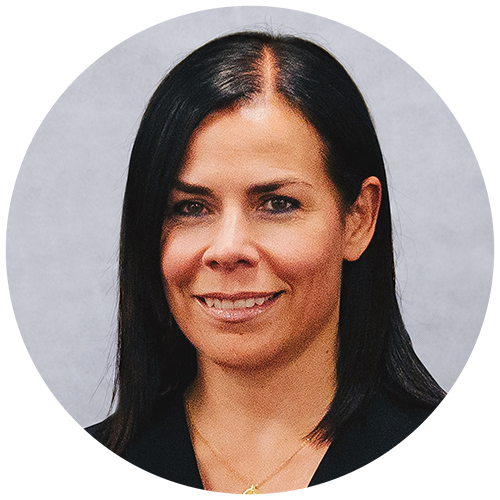
Zoë Morris is the President of Frank Recruitment Group and oversees our business and sales operations, staff training, and hiring initiatives. She’s been instrumental in building the company into the global powerhouse it is today, with more than 2,700 employees and 20+ offices worldwide.
Guests
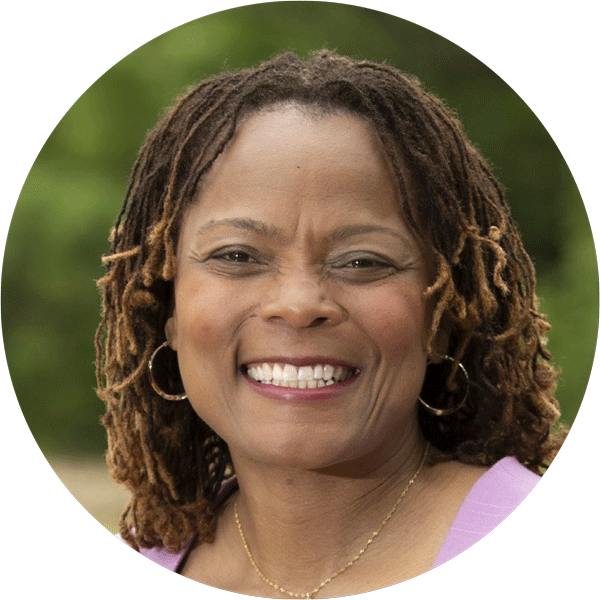
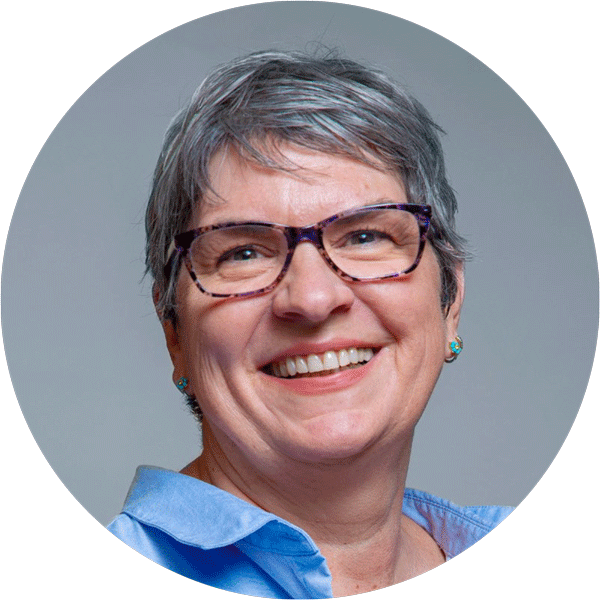
About Tech’s Leading Women
Tech’s Leading Women is a vodcast series inspired by a recent whitepaper published by Frank Recruitment Group, spotlighting some of the key issues facing women in the tech industry today.
In each episode, we explore a different topic in more depth, with unique insights and opinions from inspirational thought leaders across the tech world.
